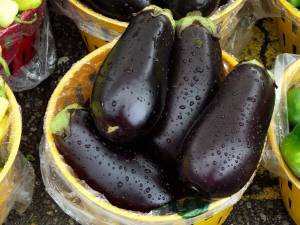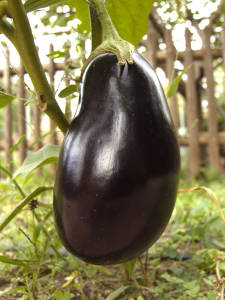Eggplant is a beloved vegetable for many health fanatics. It is large and has a thick texture which makes it the ideal replacement for a bread or pasta. It can also be used as a dip or baked.
Eggplants do best in warm climates. It will not tolerate frost and persistently low temperatures. Ideally it will be grown in temperatures of 18°C to 30°C (65°F – 85°F). It loves tropical climates but will suit most climates as long as it is planted at the right time. In many areas it is best to plant coming out of winter, but in colder areas it’s a good idea to plant at the end of spring so that the eggplant can absorb all of the summer heat.
Planting Eggplants
Eggplants should be sown a 1/2 inch deep (1cm) in containers or directly in to the ground. In especially cold areas, starting in seed trays is a good idea in order to maximize the growing time available. To improve the humidity for seedlings they can be covered with plastic film and placed near the window. Seedlings take 2-3 weeks to germinated. Prick them out in to pots and transplant when the temperature is in the previously mentioned range.
The ideal time to transplant is when plants are 2-4 inches tall. Prepare the soil with a small amount of general fertilizer and dig in well rotted organic matter 3-4 weeks before planting. Soil needs to be free-draining and have a pH of between 6 and 7. Space them 2-3 feet (60-90cm) apart with 3 feet in between rows.
Growing Eggplants
Most varieties of eggplant take 4-5 months to mature. Some fast maturing varieties are available if your growing season is not long enough.
As eggplants are a large plant, they frequently need staking. Keep them up off the ground to avoid rot. Some smaller varieties will not require staking.
Water regularly, especially during the later periods of growth. Use a mulch to maintain soil moisture and keep weeds down. Once fruits have formed, water every fortnight with a fertilizer high in potash.
Eggplants can be grown in container 8 to 12 inches in diameter. They still need lots of warmth and sunlight, so ideally the container material will retain heat to maintain a constantly warm soil temperature.
Harvesting Eggplants
Harvest eggplants when the skin is smooth and shiny. Leaving them in the ground for too long creates a bitter taste. Simply cut the stalks near the stem. They will keep for a couple of weeks in the refrigerator. If needed in the future, wash the eggplant before cutting it up in to slices and blanching it for 4 minutes. Store in the freezer in seal-able bags.
Threats to Eggplant
Be sure to keep eggplant up off the moist ground so that it doesn’t rot. Use a stake to do this. Bugs are a frequent problem with eggplant. Fungal diseases only strike occasionally.


